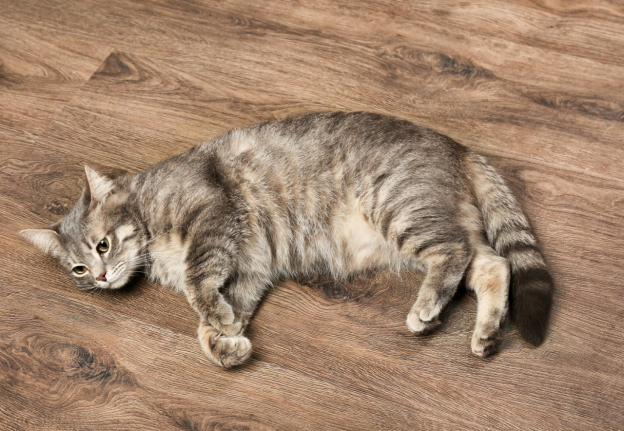Diabetes mellitus develops when the body's need for insulin is greater than its capacity to either produce or utilize the hormone insulin. When someone has a lot of fat in their chest and belly, it might be difficult to breathe properly. Cats who are overweight have an increased risk of developing hepatic lipidosis, which may be deadly. Asthma. Cats often suffer from asthma, and some of the most common symptoms include panting, wheezing, coughing, and an increased respiratory rate.
A cat can't cure asthma; however, corticosteroids or bronchodilators may be of assistance. Scientists have shown that fat may accumulate in people's lungs for the first time. According to recent research, fatty tissue found in the walls of airways may alter its structure, leading to inflammation. This inflammation can lead to wheezing and asthma.
Overweight cats may be more likely to be breathless than average-weight cats, but this isn't always the case. In addition, painting may indicate problems with the upper and lower airways, cancer, and lung illnesses such as pneumonia, and abdominal distention, among other things. Puffing one's chest out often indicates that one is in pain, feels uncomfortable, or is anxious.
It is not particularly usual to watch a cat pant or breathe heavily, but this behavior may be seen in cats experiencing difficulties with their respiratory systems (dyspnea). Cats tend to stand or squat with their elbows bent away from their chests and their head and neck spread out when they pant, which is quite similar to how dogs pant. If you observe a cat or dog panting, you won't notice a significant difference between the two.
A cat's health and longevity suffer when it has an unhealthy amount of excess fat. It is more common for obese cats to develop conditions such as cancer, diabetes, cardiovascular disease, and high blood pressure. There is a correlation between osteoarthritis and a more rapid deterioration of the joints.
Health Concerns to Consider
● It's possible that cats with normal weights won't live as long as larger-than-average cats.
● A higher body mass index may strain joints, tendons, and ligaments, resulting in arthritic changes. It may be a very painful experience to descend from a great height.
● Cats overweight are more likely to have high blood pressure, which puts additional stress on the heart. In addition, the heart must perform a more complex function since a greater volume of body tissue requires blood circulation.
● Obesity is a major risk factor for developing diabetes mellitus because it raises the body's insulin requirements beyond its capacity to produce or utilize the hormone.
● When someone has a lot of fat in their chest and belly, it might be difficult to breathe properly.
● Cats who are overweight have an increased risk of developing hepatic lipidosis, which may be deadly.
● If they are overweight, they have an increased risk of developing a condition that affects the urinary system.
● Because being overweight may negatively impact the function of your cat's heart and lungs, it may be riskier for them to have surgery. It's possible that an obese person's liver or kidneys aren't performing as effectively as they should be, which might prevent anesthetic medications from being broken down adequately and lead to an overdose of the drugs.
Do overweight cats have labored breathing?
A cat that is overweight may have rapid breathing not just because they are overheated, which is more common if they are obese, but also because they have type II diabetes, which is linked to obesity. Pain or stress, fever or shock, dehydration, anemia, lung illness, heart disease, and a buildup of toxic substances in the blood due to renal failure, diabetes, or poisoning are some other factors that might lead someone to live fast. Other factors include:
Heatstroke is one more factor that should prompt rapid breathing and panting. If you notice that your cat breathes too fast at rest, you should take it to the veterinarian as soon as possible. To find out what's wrong, it's possible that X-rays and another testing will be required. This is how an overweight cat may seem like a meerkat: Some people who have cats would remark that panting is when their cat takes rapid breaths.
Urination is almost certain to follow your cat's bout of activity. When cats are brought to the veterinarian in a vehicle, they sometimes get anxious or fearful, which indicates that their energy is having an effect. When a cat pants, the water on its lips and tongue evaporates, allowing for the exchange of heated air for cold air. This helps the cat bring its internal temperature down.
A correlation has been shown between rapid breathing and shallow breathing. If a cat only takes short, shallow breaths, the mobility of its rib cage is likely limited, which drains its vitality. They breathe quickly and shallowly to lessen the discomfort of life. There is a possibility that the cat is suffering from pleurisy or a fractured rib due to it. When there is pus, blood, or serum in the chest, breathing might be difficult. The most prevalent cause of respiratory distress in cats is a condition known as pleural effusion, which gets its name from the fact that it originates from inside their bodies.
Because I am not a trained veterinarian, I don't want to discuss this further. Still, if you notice that your cat is breathing more quickly than usual when it should be at rest or tranquil, you should take it to a certified veterinarian as soon as possible. You may keep a close eye on the individual and wait to see if they calm down their breathing if you feel it's necessary. The overall message is that plump cats have a higher probability of breathing more quickly, but this does not guarantee they will.

